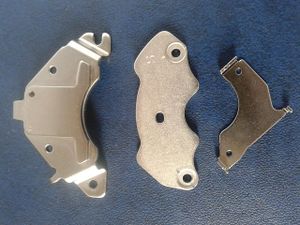Difference between revisions of "Mu-metal"
(→Availability: Updated with info regarding the brackets) |
|||
| Line 11: | Line 11: | ||
==Availability== | ==Availability== | ||
| − | Mu-metal is commonly encountered in the form of HDD magnet brackets. Old hard drives tend to have big brackets. | + | Mu-metal is commonly encountered in the form of HDD magnet brackets. Old hard drives tend to have big brackets, while those from smaller hard drives, like those used on laptops are much thinner and smaller. |
Other sources of Mumetal are old submarine cables and cathode ray tube brackets. | Other sources of Mumetal are old submarine cables and cathode ray tube brackets. | ||
| − | '''An important note to anyone looking to extract the nickel from hard drive magnet brackets''': not all of them are made of this alloy or even other nickel alloys. Some, as noted by a few SM members are actually iron alloys, probably used because they're cheaper or have similar magnetic permeability. | + | '''An important note to anyone looking to extract the nickel from hard drive magnet brackets''': not all of them are made of this alloy or even other nickel alloys. Some, as noted by a few SM members are actually iron alloys, probably used because they're cheaper or have similar magnetic permeability. SM user VSEPR_VOID managed to dissolve a hard drive magnet bracket in acid, but he was unable to detect any nickel metal, and instead he determined that the said bracket is made of an iron alloy, which further confirms that not all magnet brackets are made of Mu-metal.<ref>http://www.sciencemadness.org/talk/viewthread.php?tid=83382&page=2#pid520446</ref> |
==Projects== | ==Projects== | ||
Latest revision as of 15:17, 4 June 2018
 |
This article is a stub. Please help Sciencemadness Wiki by expanding it, adding pictures, and improving existing text.
|
Mu-metal, also known as Mu metal or Mumetal is a nickel–iron soft magnetic alloy with very high permeability widely used for shielding sensitive electronic equipment against magnetic fields. The name of the alloy comes from the Greek letter mu (μ), which the symbol for magnetic permeability.
The alloy is sold under various trade names, such as MuMETAL, Mumetall, and Mumetal2.
Contents
Composition
The alloy has several compositions, the most common being 77% nickel, 16% iron, 5% copper and 2% chromium or molybdenum. Other types include ASTM A753 Alloy 4 which consists of 80% nickel, 12 to 15% iron, 5% molybdenum and other elements such as silicon.
Properties
Mu-metal is resistant to corrosion, though acids will slowly dissolve it in the presence of oxygen.
Availability
Mu-metal is commonly encountered in the form of HDD magnet brackets. Old hard drives tend to have big brackets, while those from smaller hard drives, like those used on laptops are much thinner and smaller.
Other sources of Mumetal are old submarine cables and cathode ray tube brackets.
An important note to anyone looking to extract the nickel from hard drive magnet brackets: not all of them are made of this alloy or even other nickel alloys. Some, as noted by a few SM members are actually iron alloys, probably used because they're cheaper or have similar magnetic permeability. SM user VSEPR_VOID managed to dissolve a hard drive magnet bracket in acid, but he was unable to detect any nickel metal, and instead he determined that the said bracket is made of an iron alloy, which further confirms that not all magnet brackets are made of Mu-metal.[1]
Projects
- Extract elemental nickel
- Magnetic shielding
Handling
Safety
Mu-metal is relative inert, but due to its high nickel content, it may cause dermatitis to some people.
Storage
No special storage is required, as the alloy is relative inert to most reagents. Mu-metal should be kept in closed containers.
Disposal
Best to try to recycle it.
